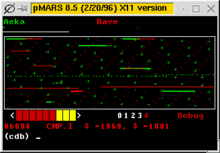Programming game
A programming game is a computer game in which the player has no direct influence on the course of the game, but instead writes a computer program in a domain-specific language that controls the game character, usually a robot, tank or a bacterium.
The characters then fight against each other autonomously in "arenas" and try to destroy each other until only one is left. The player who wrote the best program wins. However, there is usually no such thing as a “ jack of all trades ”: Programs that pursue certain strategies and easily beat certain types of programs are themselves susceptible to other strategies, for example the “replicators”, “bombers” and “scanners” in Core War (see rock-paper-scissors ).
Well-known programming games are Core War , Crobots , Robocode , Dnafight, Robot Battle, Robowar and TORCS .
Darwin (1961) is considered to be the first programming game.
Programming games as educational games
Programming games often aim to introduce beginners to a programming language and to encourage the writing of optimized code. The individual program sequences are usually limited in time so that the best possible sequences must be written in a short time frame.
Since the commands to control the character are limited, the programming languages can be learned in a simplified environment. Examples of such games are: Robocode ( Java , C #, VB.NET ), Crobots ( C ), Marvin's Arena ( C # , VB.NET, C ++ ), AntMe! (C #, VB.NET). Some games have also developed their own simplified programming languages (so-called mini - languages ) to help beginners get started. Examples are Robot Karol , Kara and Niki - the robot . Education-oriented programming languages often have ready-made tasks or the possibility of creating tasks that the learners can try to solve, but also offer the possibility of programming their own projects.
Modern programming games are not only aimed at learners, but also at the entertainment market and are intended to challenge the player to solve logical puzzles using programming techniques. Known examples are 7 trillion Humans or Shenzhen I / O . There are also many browser games and mobile phone games with this theme, which fall under the category of brain teasers and puzzle games .
See also
Web links
- List of programming games on aiforge.net ( Memento from August 11, 2015 in the Internet Archive )
Individual evidence
- ↑ 7 Billion Humans - Test, Skill - 4Players.de. Retrieved August 19, 2019 .
- ↑ Shenzhen I / O: Programming game has left Early Access - 4Players.de. Retrieved August 19, 2019 .
